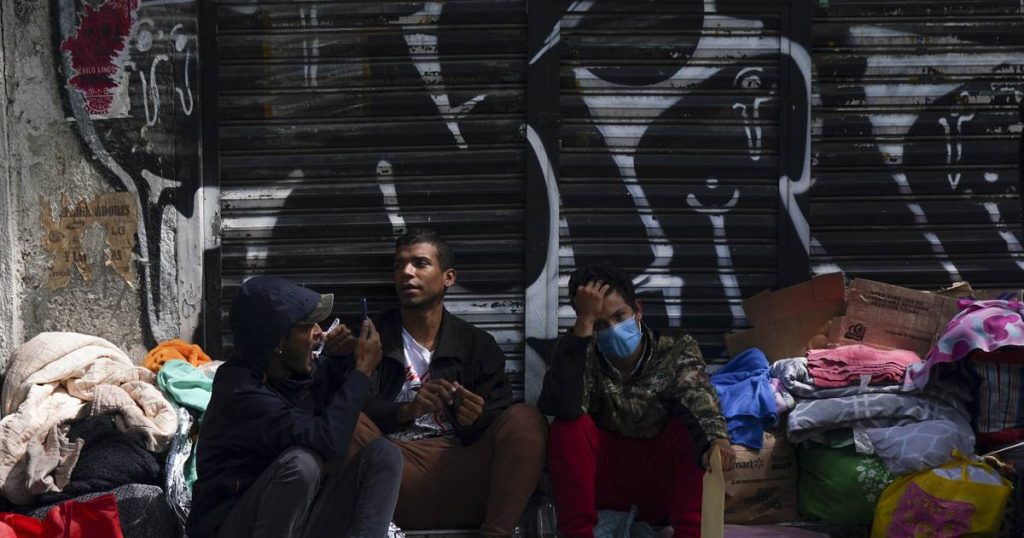Ciudad Hidalgo – A few days after the start of a new plan to manage the influx of Venezuelan migrants on their way to the United States, the Mexican government said irregular crossings had been significantly reduced and carried out a joint deterrence exercise with the Guatemalan government at one of the crossings with that country.
Arturo Rocha, of the State Department, noted via Twitter that in recent days, the number of arrivals to the United States through the border with Mexico has been reduced by 90%, and irregular crossings across the border have decreased by 80%. Darren, the forest that separates Colombia and Panama.
Under the new program, Washington will grant up to 24,000 temporary visas to Venezuelans who register online, have a sponsor in the United States, and enter the country by air. But at the same time, he will expel those who reach overland into Mexico, where most of them crossed. According to the Mexican government, it has so far returned more than 1,700 Venezuelans.
So the message from both countries was to stay put and not continue on their way north.

According to Rocha, more than 7,500 applications for these temporary visas have already been processed and the first 100 flights approved.
Mexican President Andres Manuel Lopez Obrador expressed confidence that the program could be expanded in the future, and noted that it was important for immigrants to know that they could apply for the new scheme “without going through Mexico” because those now entering the country illegally would not. . longer able to access it.
The president added that the National Institute of Migration has begun work on informing immigrants. However, on the border with Guatemala, the information did not spread, but military exercises on the border bridge to discourage migrants from it.
“This is how we should act, first the Grupo Beta, then the National Guard, in the event of attacks from a possible convoy,” said a military man who gave orders during operator training on the international bridge Friday morning.
Meanwhile, a few meters from that point, migrants continued to cross the Suchiate River on artisanal boats in constant motion between Guatemalan and Mexican territory.
Upon entering Mexico, most of them approached the immigration authorities to surrender. The Associated Press did not say that the migrants crossing the river were given any information about the US plan at the time.
Officials, as they had done for months, gave them an exit letter and told them they could go to a town 300 kilometers north – San Pedro Tabanatipec – to continue their efforts there.
At that point on the isthmus, which is the narrowest place in Mexico and therefore, much easier to control than the porous border with Guatemala, thousands of immigrants piled up for weeks in a huge camp where the Mexican National Institute of Migration provided them with some documents. Which, in practice, can legally pass through the country.
Now, according to Hector Martínez Castoeira, Director of the Coordination Offices of the Iraqi National Movement, Friday in brief statements to the press on the border with Guatemala, such documents are no longer issued.
“There (in Tapanatepec) we installed a shelter dedicated to the care of migrants, a big shelter, but we are not providing any coordination at the moment, simply and simply, they are directed until they come to try to regularize their situation,” he said.
Martinez-Castoeira added that Mexico is analyzing the return of Venezuelans, which is complicated because the government in Caracas generally does not accept them, and said that “many Venezuelans” have requested it.
Guatemalan Deputy Foreign Minister Yovanni Castillo, who was present at the border bridge exercises, said that migration is a common problem and that is why the two countries are seeking common solutions, as well as providing humanitarian assistance to people on the move.
On Friday, the Ministry of Foreign Affairs was scheduled to hold meetings with international agencies to develop a humanitarian plan for the care of migrants. Thousands of Venezuelans are now in Mexico without being clear about their plans.

“Social media evangelist. Student. Reader. Troublemaker. Typical introvert.”

:quality(85)/cloudfront-us-east-1.images.arcpublishing.com/infobae/TEQF6EONZRFGLLLDIDD4L2O4EE.jpg)

:quality(75)/cloudfront-us-east-1.images.arcpublishing.com/elcomercio/XU32LRAEZFDDPNVHLFU3CKVBYY.jpg)



More Stories
Venezuela ranks fourth in female leadership in science and technology in Latin America
In Portuguesa and Sucre they explore the wonderful world of science
The university court overturns the expulsion of two teachers and a chemical sciences student